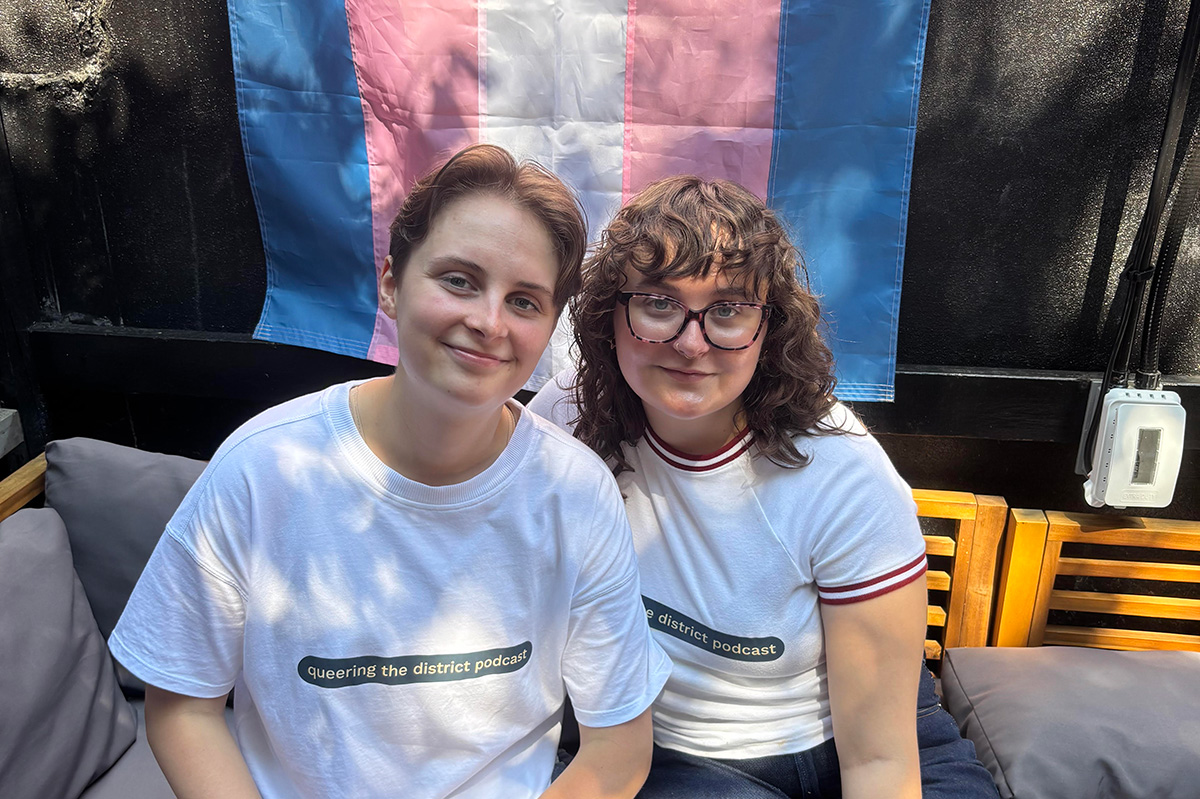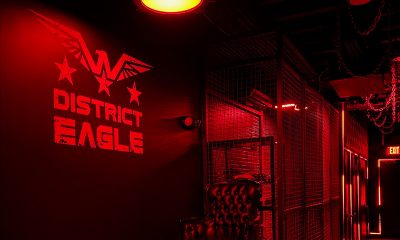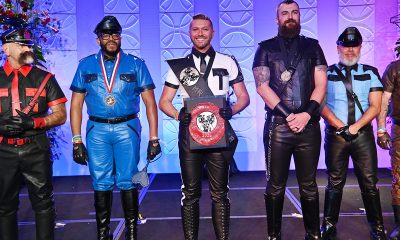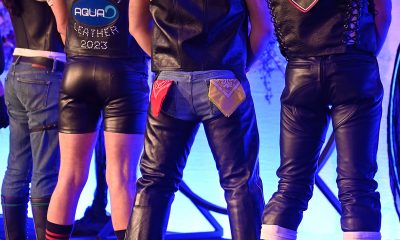Arts & Entertainment
Social Agenda
friday, jan. 15
Mid-Atlantic Leather Weekend, one of the largest gay leather gatherings in the world, is this weekend in Washington at the Washington Plaza Hotel. The event is sold out but some spillover hotels have rooms available and some events are open to the public. Visit leatherweekend.com for more information.
Gay District meets tonight. The group was formerly known as the Twenties Group but has expanded its age range for gay, bi, trans and questioning men from 18 to 35. The group meets for weekly discussion from 8:30 to 9:30 every Friday at St. Margaret’s Church located at 1830 Connecticut Ave. Members dine afterwards then go dancing. The group is changing its contact information but for now, those interested can visit the group on Facebook under the name “GD: Gay District.”
The D.C. Cowboys are having a new event starting tonight called Brodeo at Remington’s. It will feature country, western, disco and club music, performances, giveaways, Jell-O shots, an auction and the Cowboys. Proceeds benefit the group, which uses funds to facilitate its ability to provide free entertainment for HIV and AIDS charity groups. For more information, visit dccowboys.org. Remington’s is at 639 Pennsylvania Ave., S.E.
saturday, jan. 16
A new gay-owned gallery called Industry Gallery opens tonight from 6 to 8 p.m. with “Round the Corner,” the debut solo U.S. exhibition of Jerusalem-born artist Shlomo Harush. Visit industrygallerydc.com for more information. The gallery will be open Wednesdays through Saturdays from 11 a.m. to 5 p.m.
Town has two events tonight. DJ Brett Henrichsen spins upstairs (Town’s regular DJ Wess is downstairs). And monthly party “WTF?” is also tonight with a special Mexican installment. Doors open at 10 p.m. Town is located at 2009 Eighth Street, N.W. Visit towndc.com for more information.
Blowoff, a monthly party featuring gay DJs/remixers Bob Mould and Rich Morel, is tonight at the 9:30 club, located at 815 V Street, N.W. starting at 11:30 p.m. Visit blowoff.us for more information.
sunday, jan. 17
Reaction, the closing night party for Mid-Atlantic Leather Weekend, is tonight from 10 p.m. to 5 a.m. at the 9:30 club, located at 815 V Street, N.W., with music by DJ David LaSalle and entertainment by German retro singer Myke Lowe. Tickets are $35 in advance or $45 at the door. They’re available at the Leather Rack or ticketfly.com.
monday, jan. 18
Metropolitan Community Church of Washington, the District’s largest mostly gay church, has an HIV positive support group for people of faith every Monday at the church. For more information, contact Matt Senger at 202-546-2159 or e-mail him at [email protected]. MCC-DC is located at 474 Ridge Street, N.W. Visit mccdc.com for more information about the church.
Freddie’s Beach Bar, located at 555 S. 23rd Street in Crystal City, Va., has disco trivia every Monday at 8 p.m.
tuesday, jan. 19
A remembrance event for Martin Luther King Jr. is being held tonight by the GLBT Arts Consortium from 7 to 9 p.m. at Capitol Hill Presbyterian Church at 4th and Independence Ave., S.E. near the Eastern Market and Capitol South Metro stations. The event is free and open to the public.
D.C.’s HIV Working Group assembles safer sex kits with its “packing parties” every Tuesday at EFN Lounge. Those who volunteer their time get drink discounts. The events are held from 7 to 10:30 p.m. at Motley Bar, located above EFN, which is at 1318 9th St., N.W. Visit fighthivindc.com for more information.
Poz, a bar night for HIV-positive men and men open to dating HIV-positive men regardless of their own HIV status, is held every Tuesday night from 7 p.m. to midnight at Motley Bar, located above EFN Lounge at 1318 19th St., N.W. The event is organized by HIV-positive party promoter Jacob Pring. Visit the group’s Facebook page at facebook.com/pozdc for more information.
Hollaback, a social club and support group for trans people, presented by Alpha Drugs, is tonight at 1638 R St., N.W., Suite 260. To RSVP, call Dee Curry at 202-290-0324.
Cobalt has “Flashback,” a retro night, every Tuesday at 10 p.m. Cobalt is at the corner of 17th and R streets, N.W.
wednesday, jan. 20
The National Gay and Lesbian Task Force has weekly volunteer nights every Wednesday from 6 to 7:30 p.m. at its offices located at 1325 Massachusetts Ave., N.W., Suite 600. Volunteers fold and stuff letters for the gay rights organization. Pizza is provided. For more information, contact Ezra Towne at [email protected].
Ladies First night is tonight and every Wednesday at Fab Lounge, located at 1805 Connecticut Ave., N.W. For more information, visit myspace.com/ladiesfirst.
An HIV/AIDS support group, presented by Alpha Drugs, is tonight at 1638 R St., N.W., Suite 260. Dinner will be served but reservations are required. To RSVP, call 301-735-2805 or 301-674-8901.
The D.C. Center has career development for LGBT job seekers today from 3 to 4:30 p.m. Trained counselors will offer support for job searching, interviewing skills, resume writing, etc. The program has been adapted to meet the needs of the local gay community and the D.C. job market. The Center recently moved to its new location at 1804/1810 14th St., N.W., previous home of the Lesbian Services Program and Austin Center of Whitman-Walker Clinic. Visit thedccenter.org for more information.
thursday, jan. 21
D.C. Lambda Squares, a local gay square dancing group, meets every Thursday for square dancing. Those who’ve taken the group’s “Mainstream” and “Plus” classes dance on the first and third Thursdays. “Plus” and “Advanced” classes are on the second and fourth Thursdays. For more information about the group or to find out when beginner classes are available, visit dclambdasquares.org.
friday, jan. 22
A GaySpirits event is being held this weekend in Annandale, Va. It’s a spiritual retreat for gay men who’ve avoided religion because many faiths condemn them. GaySpirits creators say gay men have “unique spiritual giftedness.” The events will take place at Little River U.C.C., located at 8410 Little River Turnpike, tonight from 7 to 9:30 p.m. and on Saturday from 9 a.m. to 6:30 p.m. Cost is $70. For more information, visit gayspirits.com or call 301-580-2953.
saturday, jan. 23
Adventuring Outdoors Group, a gay hiking group, is joining the Chrysalis Arts and Culture Group, another local gay social outfit, for a trip to Gettysburg today. A moderate 6-mile hike is planned with some steep passages. Those interested should bring beverages, lunch, hiking shoes and about $12 for transportation fees. The groups will meet at 9 a.m. at the Grosvenor-Strathmore Metro Station. For more information, contact Craig at 202-462-0535 or [email protected].
D.C. Lambda Squares, a local gay square dancing outfit, has a community dance today with guest caller Jeremy Butler from Virginia Beach. The dance will be held from 7 to 10 p.m. at Sligo Middle School in Silver Spring, Md. Cost is $10. For more information about this or other club affairs, visit dclambdasquares.org.
Several local gay social groups are joining D.C. Icebreakers, a local gay ice skating group, tonight for a large social event at the Kettler Capitals Iceplex in Ballston. Skating will run from 8 to 9 p.m. with a social to follow at Bailey’s Pub and Grill. Other groups slated to join the Icebreakers are Zoom Urban Lesbian Excursions, NOVA Gay & Lesbian Professionals, D.C. Lesbian Singles, Burgundy Crescent Volunteers, NOVA Dynamic Lesbian Singles, the Mixed Ladies Arlington Pool League and Social Cheverly. For more information, visit dcicebreakers.org.
Photos
PHOTOS: Independence Day Weekend in Rehoboth
Wicked Green Pool Party, fireworks among festivities

Vacationers and residents alike enjoyed Independence Day Weekend activities in Rehoboth Beach, Del. The Wicked Green Pool Party drew hundreds to the CAMP Rehoboth fundraiser on Saturday. That evening, revelers went to the rooftops to watch the fireworks display.
(Washington Blade photos by Daniel Truitt)













Music & Concerts
Red, White, and Beyoncé: Queen Bey takes Cowboy Carter to D.C. for the Fourth of July
The legendary music icon performed on July 4 and 7 to a nearly sold-out Northwest Stadium.

Just in time for Independence Day, Beyoncé lit up Landover’s Commanders Field (formerly FedEx Field) with fireworks and fiery patriotism, bringing her deeply moving and genre-defying “Cowboy Carter” tour to the Washington, D.C. area.
The tour, which takes the global icon across nine cities in support of her chart-topping and Grammy-winning country album “Cowboy Carter,” landed in Prince George’s County, Maryland, over the Fourth of July weekend. From the moment Beyoncé stepped on stage, it was clear this was more than just a concert — it was a reclamation.
Drawing from classic Americana, sharp political commentary, and a reimagined vision of country music, the show served as a powerful reminder of how Black Americans — especially Black women — have long been overlooked in spaces they helped create. “Cowboy Carter” released in March 2024, is the second act in Beyoncé’s genre-traversing trilogy. With it, she became the first Black woman to win a Grammy for Best Country Album and also took home the coveted Album of the Year.
The record examines the Black American experience through the lens of country music, grappling with the tension between the mythology of the American Dream and the lived realities of those historically excluded from it. That theme comes alive in the show’s opening number, “American Requiem,” where Beyoncé sings:
“Said I wouldn’t saddle up, but
If that ain’t country, tell me, what is?
Plant my bare feet on solid ground for years
They don’t, don’t know how hard I had to fight for this
When I sing my song…”
Throughout the performance, Beyoncé incorporated arresting visuals: Black cowboys on horseback, vintage American iconography, and Fox News clips criticizing her genre shift — all woven together with voiceovers from country legends like Dolly Parton and Willie Nelson. The result was a multimedia masterclass in storytelling and subversion.
The “Cowboy Carter” tour has been a social media sensation for weeks, with fans scrambling for tickets, curating elaborate “cowboy couture” outfits, and tailgating under the summer sun. At Commanders Field, thousands waited in long lines for exclusive merch and even longer ones to enter the stadium — a pilgrimage that, for many, felt more like attending church than a concert.
One group out in full force for the concert was Black queer men — some rocking “denim on denim on denim on denim,” while others opted for more polished Cowboy Couture looks. The celebration of Black identity within Americana was ever-present, making the concert feel like the world’s biggest gay country-western club.
A standout moment of the night was the appearance of Beyoncé’s 13-year-old daughter, Blue Ivy Carter. Commanding the stage with poise and power, she matched the intensity and choreography of her mother and the professional dancers — a remarkable feat for someone her age and a clear sign that the Carter legacy continues to shine.
It’s been nearly two decades since Beyoncé and Destiny’s Child parted ways, and since then, she’s more than lived up to her title as the voice of a generation. With “Cowboy Carter,” she’s not just making music — she’s rewriting history and reclaiming the space Black artists have always deserved in the country canon.
a&e features
From Prohibition to Pride: Queering the District podcast reveals local LGBTQ history
The new podcast explores the hidden history and enduring impact of queer spaces in Washington, D.C.

On June 25, as Pride month inched toward its end, three queer creators launched an ambitious project to honor the spaces that built D.C.’s LGBTQ community—and connect them to today’s queer life. The first episode of their podcast, Queering the District, hit streaming platforms that day, aiming to spotlight what host and co-creator Abby Stuckrath calls “third places”: bars, clubs, and gathering spots that have served as hubs for queer life across the city.
Each episode of the 10-part series delves into a different piece of D.C.’s queer past—from landmark clubs to untold personal stories—told through the voices of drag legends, activists, DJs, historians, and patrons who lived it. The show also threads together personal experiences from today’s community, bringing the listener on an auditory journey from Prohibition-era speakeasies to contemporary nights out at places like As You Are or Saints & Sinners.
Abby Stuckrath, alongside her sibling Ellie Stuckrath, and producer Mads Reagan, make up the podcast’s creative team. A recent journalism graduate of American University, Abby told the Blade that her passion for queer storytelling began during college—and that D.C. itself played a defining role in shaping her queer identity.
“I went to American University. I graduated last year and studied journalism. When I was in school, I always wanted to focus on queer stories – especially in D.C., because I’m from Denver, Colorado, I’ve never lived in a place like this before. D.C. has always just kind of been a place I call home when it comes to my queer identity.”
But breaking into the media to tell those stories wasn’t easy. Stuckrath quickly learned that editorial support—and funding—for queer-focused projects is limited. So she decided to do it her own way.
“I kind of found out that if you want to tell stories, you kind of have to do it on your own– especially when it comes to queer stories. There’s not a lot of people begging for us to talk about queer people and to pay you for it. So I was like, ‘Okay, let’s just do it on my own.’”
The idea for the podcast first took root in conversations with Ellie, Abby’s sibling and biggest supporter. Ellie had also moved to D.C. to find more space to explore and express their queer and gender identities. Together, the two began shaping a vision that would combine storytelling, sound design, and grassroots community input.
“I was like, ‘I don’t know what exactly I want to do yet, but I want it to be queer, and I want it to be about D.C., and it’s going to be called Queering the District, and we’re going to find out what that means.’ And Ellie is my biggest supporter, and my best friend. And they were like, ‘Hell yeah. Like, let’s do this.’ And so we decided to just do it together.”
The name stuck—and so did the mission. The team began researching queer D.C. history and found a city overflowing with stories that had rarely been documented, especially in mainstream archives.
“We started looking up the history of queer culture in D.C., and it kind of just clicked from there,” Stuckrath said. “I did not know anything about how rich our history is in the city until one Google search, and then I just kept learning more and more. I was kind of pissed because I studied gender studies in school in D.C. and didn’t learn shit about this.”
Season one focuses on the role of third places—non-work, non-home spaces where queer people could gather, exist fully, and build community.
“Third places have always been the epicenter of queer life… places outside of just your own personal home, because sometimes that isn’t a safe place. And of course, the work most commonly in the past and still today, isn’t a safe place for queer people to be full of themselves. So like, bars were the first place for queer people to really thrive and meet each other.”
To make the show participatory, Queering the District includes a twist: a voicemail line where anyone can call in and share a memory or question. The team calls the phone “Fifi”—a nod to the kind of retro guestbooks often used at weddings, but reimagined for queer nightlife and history.
“We wanted to find a way for people to share their stories with us anonymously… so even though we start in Prohibition, we wanted to connect it to now—like, those people who were singing jazz to each other in a white queer bar are connected to you singing karaoke on a Sunday night at your favorite gay bar. We’re all interconnected by this third place of queer bars in D.C.”
Those connections are emotional as well as historical. While building the series, one realization hit Stuckrath particularly hard: the immense loss of queer spaces in D.C., especially in neighborhoods that have since been heavily redeveloped.
“Every time I go to a Nats game, I think about, well, this just replaced five gay bars that used to be here. It used to be the home of Ziegfeld’s… Tracks, which was almost 2,000 square feet, with a volleyball court in the back, a fire pit, and iconic light show. I just didn’t know that we had that, and it made me sad for the queer elders that are in our city now who walk the streets and don’t see all those places they used to call home.”
That sense of loss—alongside the joy and resilience of queer community—is what the show aims to capture. As the podcast continues, Abby hopes it serves as both a celebration and an educational tool, especially for young LGBTQ people arriving in D.C. without realizing the queer foundations they’re walking on.
“D.C. is a unique city, and specifically young queer people who are hoping to move to the city—to know that you’ve got to know your history to be here. I hope this serves as an easier way for you to consume and learn about queer history, because queer history defines how we move in life.”
And for all the voices still left out, Abby is clear: this podcast is an open door, not a final word.
“This is a perfectly imperfect podcast. We should just be a starting point. We shouldn’t be the ending point.”
New episodes of Queering the District drop every Wednesday on all major platforms.
-

 Virginia2 days ago
Virginia2 days agoDefying trends, new LGBTQ center opens in rural Winchester, Va.
-

 South Africa5 days ago
South Africa5 days agoLesbian feminist becomes South African MP
-

 Travel3 days ago
Travel3 days agoManchester is vibrant tapestry of culture, history, and Pride
-

 Opinions3 days ago
Opinions3 days agoUSAID’s demise: America’s global betrayal of trust with LGBTQ people












